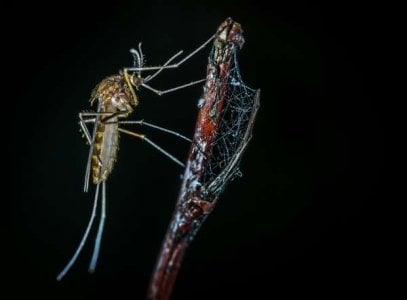This dangerous virus has spread to other states. Here's how to keep yourself safe
By
Danielle F.
- Replies 18
The summer season brings with it warm weather and an opportunity to enjoy the outdoors.
Yet, there's an important health alert that residents and tourists need to be aware of.
Reports of a rare but potentially severe brain infection recently made waves in New South Wales.
This time, concerns started to rise in Victoria's north area.
A case of Japanese encephalitis, a mosquito-borne virus, has been detected in the Moira Shire.
This case sparked concern among locals, including popular destinations like Yarrawonga and various camping spots along the River Murray.
According to the state's health department, it marked the first detection of the mosquito-borne disease this season.
Victoria Chief Health Officer Tarun Weeramanthri emphasised the severity of the situation.
'Japanese encephalitis virus can cause a rare but potentially serious infection of the brain and is spread to humans through bites from infected mosquitoes,' Officer Weeramanthri stated.
'If you're visiting northern Victoria, particularly inland riverine regions and near the Murray River, you're potentially at higher risk of infection.'
In related news, 60-year-old Stephen Bond—who had been working near the Murray River—contracted Japanese encephalitis.
After experiencing symptoms like headache and fever in early December, his condition rapidly deteriorated.
He was rushed to the St Vincent's ICU in Melbourne and is in critical condition.
Japanese encephalitis is more than just a mosquito bite.
Symptoms of the virus develop within five to fifteen days after a bite from an infected mosquito.
The symptoms include fever, headache, vomiting and seizures.
Some cases of Japanese encephalitis could be fatal, which underscored the importance of taking preventative measures.
Victoria's health department urged everyone, especially those looking forward to a holiday in the state, to be vigilant in preventing mosquito bites.
'It's important to take steps to prevent mosquito bites, so cover up, use repellent and limit your time outdoors when mosquitoes are about,' Officer Weeramanthri emphasised.
Campers staying in tents or caravans should have functional mosquito screens to prevent mosquitoes from buzzing in.
Mosquito nets provide an additional layer of protection from the insects.
In previous news, NSW Health has issued a warning about the risk of Japanese encephalitis, a deadly mosquito-borne virus, in 55 inland council areas.
NSW residents in the identified areas of concern should be eligible for a free vaccine and were advised to take preventive measures against mosquito bites.
While there is no specific treatment yet for Japanese encephalitis, prevention is key.
Free vaccines are available in 24 high-risk local government areas in northern Victoria.
The vaccines are free for eligible residents. Residents may go through Victoria Health for more details about the initiative.
By staying informed and taking proactive steps to protect ourselves and our loved ones, your summer memories should be filled with joy instead of concern.

Have you taken any precautions against mosquito-borne diseases? Share your tips with us in the comments below, and let's keep our community informed and protected.
Yet, there's an important health alert that residents and tourists need to be aware of.
Reports of a rare but potentially severe brain infection recently made waves in New South Wales.
This time, concerns started to rise in Victoria's north area.
A case of Japanese encephalitis, a mosquito-borne virus, has been detected in the Moira Shire.
This case sparked concern among locals, including popular destinations like Yarrawonga and various camping spots along the River Murray.
According to the state's health department, it marked the first detection of the mosquito-borne disease this season.
Victoria Chief Health Officer Tarun Weeramanthri emphasised the severity of the situation.
'Japanese encephalitis virus can cause a rare but potentially serious infection of the brain and is spread to humans through bites from infected mosquitoes,' Officer Weeramanthri stated.
'If you're visiting northern Victoria, particularly inland riverine regions and near the Murray River, you're potentially at higher risk of infection.'
In related news, 60-year-old Stephen Bond—who had been working near the Murray River—contracted Japanese encephalitis.
After experiencing symptoms like headache and fever in early December, his condition rapidly deteriorated.
He was rushed to the St Vincent's ICU in Melbourne and is in critical condition.
Japanese encephalitis is more than just a mosquito bite.
Symptoms of the virus develop within five to fifteen days after a bite from an infected mosquito.
The symptoms include fever, headache, vomiting and seizures.
Some cases of Japanese encephalitis could be fatal, which underscored the importance of taking preventative measures.
Victoria's health department urged everyone, especially those looking forward to a holiday in the state, to be vigilant in preventing mosquito bites.
'It's important to take steps to prevent mosquito bites, so cover up, use repellent and limit your time outdoors when mosquitoes are about,' Officer Weeramanthri emphasised.
Campers staying in tents or caravans should have functional mosquito screens to prevent mosquitoes from buzzing in.
Mosquito nets provide an additional layer of protection from the insects.
In previous news, NSW Health has issued a warning about the risk of Japanese encephalitis, a deadly mosquito-borne virus, in 55 inland council areas.
NSW residents in the identified areas of concern should be eligible for a free vaccine and were advised to take preventive measures against mosquito bites.
While there is no specific treatment yet for Japanese encephalitis, prevention is key.
Free vaccines are available in 24 high-risk local government areas in northern Victoria.
The vaccines are free for eligible residents. Residents may go through Victoria Health for more details about the initiative.
By staying informed and taking proactive steps to protect ourselves and our loved ones, your summer memories should be filled with joy instead of concern.
Key Takeaways
- A case of Japanese encephalitis has been detected in Moira Shire, putting holidaymakers and residents at higher risk of contracting the infection.
- The detection marked the first time the disease has been recorded this season.
- Victoria's Chief Health Officer Tarun Weeramanthri advised taking precautions against mosquito bites, especially when visiting northern Victoria.
- There is no specific treatment for Japanese encephalitis, but a free vaccine is available for residents in high-risk areas.








